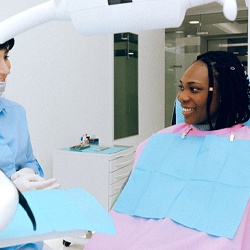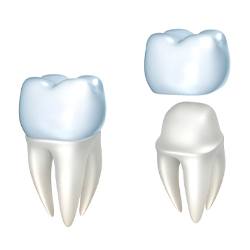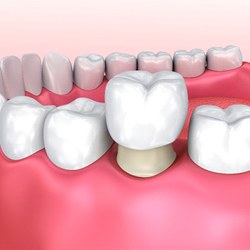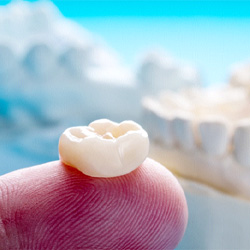Dental Crowns – Louisville, KY
Reinstate a Healthy, Beautiful Smile

Your teeth are the hardest substance in your body, but they aren’t indestructible. Thankfully, you can avoid the complications of missing teeth by rehabilitating a damaged tooth with a crown. The custom-made protective caps are the most common restorative procedure because they are effective in treating many issues. You might be envisioning a dark metal cap, but modern dental crowns in Louisville are made of porcelain or ceramic to look natural. If you have a severely compromised tooth, we can restore the health and beauty of your smile using a proven solution.
What is a Dental Crown?

A dental crown encompasses the entire surface of a tooth above the gum line, which requires a small amount of enamel to be removed to allow the cap to fit over it. Although it will alter your tooth, it can save it from extraction if it has been damaged by decay or injury. It restores its health, function, and appearance while also giving it an added layer of protection. In some cases, a crown is combined with other treatments, such as bridges or root canals. Their versatility makes them ideal for resolving several issues, including:
- Chips or cracks
- Large area of decay
- Dark tooth discoloration or stains
- Protect a weakened tooth
- Along with root canal therapy
- To support a dental bridge
- Along with dental implants
The Dental Crown Process

After your initial consultation with your dentist in Louisville, you can expect the process to take about 2 visits. During your first appointment, we’ll clean and prepare your tooth, which includes reshaping it. We’ll take a digital impression of your mouth to get the information necessary to create your restoration. The advanced technology allows it to be customized to match your natural teeth for optimal fit and aesthetics.
It can take the dental lab a couple of weeks to craft your crown. As a result, you’ll need a temporary restoration in the meantime. It will protect your vulnerable tooth while also improving the appearance of your smile. After your final restoration has been sent back to our office, you’ll return to have your temporary crown removed and your final one bonded in place.
You’ll walk out of the office with a beautiful, durable crown that can last for a decade or longer with the proper care, like maintaining your oral hygiene and visiting your dentist regularly.
The Benefits of Getting a Dental Crown

Although dental crowns are common, they are only recommended when there aren’t any other options to repair a tooth. They provide exceptional advantages, such as:
- Treat a variety of issues
- Restore the health and function of a tooth
- Looks natural for improved confidence
- Durable to withstand the pressure of biting and chewing
- Long-term, cost-effective solution
- Covered under many dental insurance plan
Dental Crowns FAQs

Are you struggling with a damaged or decayed tooth? One of the most effective and reliable ways to treat this is with dental crowns. While you can be sure to enjoy many benefits from these restorations, it’s normal to want to know as much as you can before beginning any treatments. To help you feel well-informed about your decision, our team at Bell Dental has compiled and responded to several of the most commonly asked questions about dental crowns in Louisville. Keep reading to learn more about this treatment or give us a call today to schedule your initial consultation!
Does It Hurt to Get a Dental Crown?
Before starting any work in your mouth, your dentist will completely numb the area around your tooth with a local anesthetic to ensure you’re as comfortable as possible. This is especially necessary during your preparation phase, as we’ll need to remove a small amount of your enamel so that your restoration will fit properly. This means you shouldn’t feel any discomfort throughout your procedure. While we’ll normally numb your mouth during this portion of the process, it isn’t always required for the final crown placement. Though your tooth may feel mildly sensitive for a few days after your last appointment, you can easily manage any discomfort with over-the-counter pain relievers and by rinsing with lukewarm water.
Are Dental Crowns Permanent?
Dental crowns will need to be replaced eventually, so they aren’t considered a permanent restoration for your teeth. That said, they do provide a long-lasting solution for addressing damaged or decayed teeth, as most patients can expect them to go anywhere between 5 to 15 years with proper care. The only permanent aspect of dental crowns is the preparatory phase, as your enamel will not grow back on its own. After it’s been removed, you’ll need to cover and protect your tooth with a crown going forward. To make the most of your restoration, be sure to implement solid oral hygiene, practice a healthy lifestyle, and visit our team every six months for checkups and cleanings.
Do Dental Crowns Get Cavities?
Dental crowns can’t develop cavities, as they aren’t made up of the same organic material as your pearly whites. However, this doesn’t mean your natural teeth underneath are completely immune to decay. Since a crowned tooth is just as vulnerable to bacteria as an uncrowned one, you’ll want to take certain steps to prevent cavities. Fortunately, practicing simple and thorough oral hygiene techniques will help fight against bacteria and plaque from collecting on the gum line. You can also avoid complications by keeping a well-balanced diet and scheduling dental visits routinely.
How Do You Know When a Dental Crown Needs to Be Replaced?
The best one to determine whether your crown needs a replacement or not is your dentist. By physically examining your mouth and taking X-rays, they can assess the condition of your restoration as well as your oral health. That said, here are several indications that your crown is nearing the end of its lifetime:
- Instability : Your crown should not feel loose, especially when chewing on something sticky. Call us right away so that we can repair or replace it.
- Discomfort : This can occur if the underlying tooth is decayed, which will require us to remove the crown to treat the cavity.
- Damage : Not only can this negatively impact your self-confidence, but it may also pose a risk to your soft oral tissues.
- Dark line at the base : With porcelain-fused-to-metal crowns, the porcelain layer can wear down and reveal the metallic portion underneath. Since this can be unsightly, you may want to replace it as soon as possible.
Schedule Your Consultation Today
If you have a problematic tooth, you might be a candidate for a dental crown. Contact our office today to schedule your consultation. We look forward to preserving your beautiful smile.
